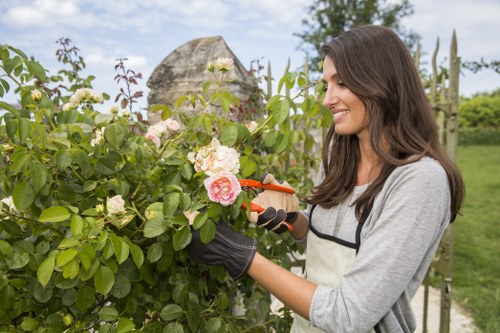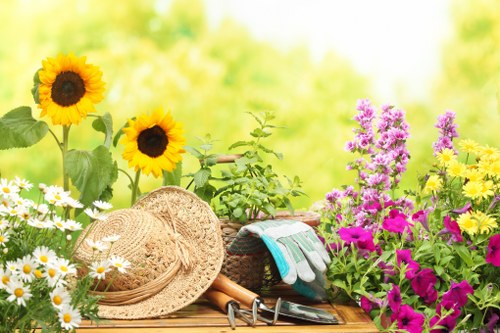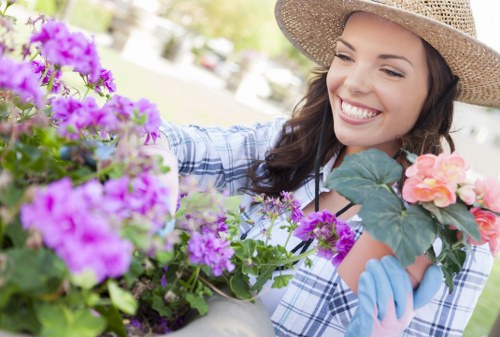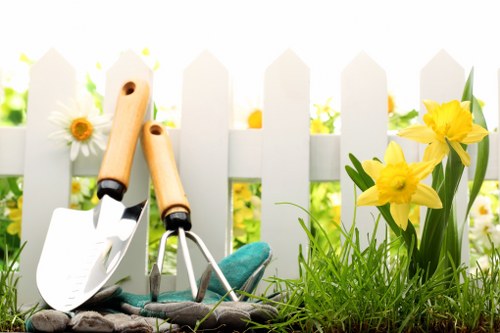Gardener Nags Head: Your Ultimate Guide to Beautiful Gardens

Gardening in Nags Head offers unique opportunities due to its coastal climate and rich soil. Whether you're a seasoned gardener or just starting, understanding the local environment is key to cultivating a thriving garden.
From selecting the right plants to maintaining your lawn, this guide provides comprehensive insights to help you achieve a beautiful and sustainable garden in Nags Head.
In this article, we will explore essential gardening tips, popular plants suited for the area, and how to tackle common gardening challenges in Nags Head.
Understanding the Nags Head Climate

Nags Head experiences a humid subtropical climate, characterized by warm summers and mild winters. This climate is ideal for a wide variety of plants, but it also presents unique challenges such as high humidity and occasional strong winds.
The average temperature in summer ranges from 75°F to 85°F, while winter temperatures typically hover between 40°F and 60°F. Knowing these temperature ranges can help you choose plants that will thrive year-round.
Additionally, Nags Head receives ample rainfall throughout the year, which is beneficial for plant growth but requires proper drainage to prevent waterlogging.
Best Times to Plant in Nags Head

The best times to plant in Nags Head are during the spring and fall. Spring planting allows plants to establish before the heat of summer, while fall planting takes advantage of the cooler temperatures and increased rainfall.
Avoid planting during the peak of summer or deep winter, as extreme temperatures can stress plants and hinder growth.
Planning your planting schedule around these optimal times can lead to healthier, more vigorous plants.
Choosing the Right Plants

Selecting plants that are well-suited to Nags Head's climate and soil conditions is crucial for a successful garden. Native plants are often the best choice, as they are adapted to the local environment and require less maintenance.
Some popular native plants include:
- Sea Grape (Coccoloba uvifera)
- Beach Morning Glory (Ipomoea pes-caprae)
- Eastern Red Cedar (Juniperus virginiana)
- Southern Magnolia (Magnolia grandiflora)
- Live Oak (Quercus virginiana)
These plants not only enhance the beauty of your garden but also attract local wildlife, contributing to a balanced ecosystem.
Flowering Plants for Vibrant Gardens

To add color and vibrancy to your garden, consider incorporating flowering plants that thrive in Nags Head. Some great options include:
- Confederate Jasmine (Trachelospermum jasminoides)
- Daylilies (Hemerocallis)
- Lantana (Lantana camara)
- Azaleas (Rhododendron)
- Butterfly Bush (Buddleia)
These plants not only provide stunning visual appeal but also attract pollinators like bees and butterflies, enhancing the overall health of your garden.
Gardening Tips for Nags Head

Maintaining a garden in Nags Head requires specific strategies to cope with the local climate and soil conditions. Here are some essential gardening tips:
- **Soil Preparation:** Test your soil to determine its pH and nutrient levels. Amend it with organic matter to improve texture and fertility.
- **Watering Practices:** Water your plants early in the morning to reduce evaporation. Use drip irrigation systems to conserve water and deliver it directly to the roots.
- **Pest Control:** Regularly inspect your plants for signs of pests and diseases. Use natural remedies or integrated pest management techniques to keep your garden healthy.
- **Mulching:** Apply a layer of mulch around your plants to retain moisture, suppress weeds, and regulate soil temperature.
- **Pruning:** Prune your plants to promote healthy growth, remove dead or diseased branches, and maintain the desired shape.
Dealing with Salt Air and Wind

Nags Head's proximity to the ocean means that salt air and strong winds can pose challenges for gardeners. To protect your plants, consider the following:
- **Windbreaks:** Plant hedges or install fences to reduce wind exposure.
- **Salt-Tolerant Plants:** Choose plants that can withstand salt spray, such as junipers, pines, and sea oats.
- **Protective Barriers:** Use netting or other barriers to shield sensitive plants from direct salt exposure.
Implementing these measures will help your garden resist the harsh coastal elements.
Local Gardening Resources in Nags Head

Access to local gardening resources can greatly enhance your gardening experience in Nags Head. Here are some valuable resources:
- **Nags Head Community Garden:** A collaborative space where local gardeners share tips, tools, and plants.
- **Local Nurseries:** Specialty nurseries in Nags Head offer a wide selection of native and salt-tolerant plants.
- **Gardening Workshops:** Attend workshops and classes to learn new techniques and stay updated on best practices.
- **Extension Services:** The local cooperative extension office provides research-based information on gardening in the area.
Utilizing these resources can help you gain knowledge, access quality plants, and connect with other gardening enthusiasts.
Community Involvement

Joining local gardening clubs or community events can provide support and inspiration. Engaging with fellow gardeners allows you to exchange ideas, share successes, and troubleshoot challenges together.
Participating in community projects, such as neighborhood beautification initiatives, can also contribute to the overall aesthetic and health of Nags Head.
Gardening Tools and Equipment

Having the right tools and equipment is essential for efficient gardening. Here are some must-have tools for gardeners in Nags Head:
- **Hand Tools:** Trowels, pruners, and hand forks for precise planting and maintenance.
- **Watering Systems:** Drip irrigation and soaker hoses to ensure consistent watering.
- **Garden Gloves:** Protect your hands from thorns, dirt, and potential injuries.
- **Mulching Materials:** Organic mulch like bark or straw to retain soil moisture and prevent weeds.
- **Composting Bins:** Recycle kitchen and garden waste to create nutrient-rich compost for your plants.
Investing in quality tools can make your gardening tasks easier and more enjoyable.
Maintaining Your Tools

Proper maintenance of your gardening tools ensures their longevity and performance. Here are some tips:
- **Cleaning:** Remove dirt and debris after each use to prevent rust and corrosion.
- **Sharpening:** Regularly sharpen blades to maintain cutting efficiency.
- **Storage:** Store tools in a dry, organized space to avoid damage and loss.
- **Repair:** Address any signs of wear or damage promptly to extend the life of your tools.
Taking good care of your tools can save you time and money in the long run.
Local Flora and Fauna in Nags Head

Nags Head is home to a diverse range of flora and fauna, making it a vibrant place for gardening. Understanding the local ecosystem can help you create a harmonious garden that supports wildlife.
Common wildlife includes:
- **Birds:** Such as the Carolina Wren and Blue Jay, which help with pest control.
- **Butterflies:** Including the Monarch and Painted Lady, attracted to flowering plants.
- **Pollinators:** Bees and other insects vital for plant reproduction.
- **Small Mammals:** Like squirrels and rabbits, which may require protective measures for your plants.
By fostering a habitat that supports these creatures, you enhance the health and beauty of your garden.
Planting for Wildlife

To attract and support local wildlife, consider planting a variety of native plants that provide food and shelter. Incorporate flowering plants, shrubs, and trees to create layers of vegetation.
Providing water sources, such as birdbaths or small ponds, can also encourage wildlife to visit your garden.
Maintaining natural areas within your garden helps create a balanced and sustainable environment.
Pest and Disease Management

Gardening in Nags Head involves managing pests and diseases to keep your plants healthy. Here are some common issues and solutions:
- **Aphids:** Use natural predators like ladybugs or spray with neem oil.
- **Powdery Mildew:** Ensure proper air circulation and avoid overhead watering.
- **Slugs and Snails:** Employ traps or barriers to reduce their impact.
- **Root Rot:** Improve soil drainage and avoid overwatering.
- **Spider Mites:** Maintain humidity levels and introduce natural predators.
Implementing preventive measures and early interventions can minimize damage and promote plant resilience.
Organic Gardening Practices

Adopting organic gardening practices enhances the sustainability and health of your garden. Focus on natural fertilizers, such as compost and manure, to enrich the soil.
Use organic pest control methods to reduce chemical usage and protect beneficial insects. Techniques like crop rotation and companion planting can also prevent pest infestations and improve soil health.
Organic gardening not only benefits your plants but also contributes to a healthier environment.
Seasonal Gardening in Nags Head

Each season in Nags Head brings its own set of gardening tasks and opportunities. Understanding seasonal changes helps you plan and maintain a dynamic garden year-round.
Spring: Ideal for planting new flowers and vegetables. Focus on soil preparation and starting seeds.
Summer: Maintain consistent watering and manage pests. Enjoy the full bloom of your garden.
Summer Care Tips

Summer in Nags Head can be hot and humid. To keep your garden thriving:
- **Mulch:** Retains soil moisture and keeps roots cool.
- **Shade Cloths:** Protect delicate plants from intense sunlight.
- **Regular Watering:** Deep watering in the early morning ensures plants receive adequate moisture.
- **Pruning:** Remove excess foliage to improve air circulation and reduce disease risk.
These practices help your garden withstand the summer heat and maintain its beauty.
Local Events and Gardening in Nags Head

Participating in local gardening events fosters community engagement and provides learning opportunities. Events such as plant swaps, garden tours, and workshops allow you to connect with other gardeners and enhance your skills.
Stay informed about upcoming events through local community boards, nurseries, and gardening clubs.
Annual Garden Shows

Annual garden shows in Nags Head showcase a variety of plants, gardening tools, and innovative landscaping ideas. These events feature expert talks, demonstrations, and hands-on workshops that can inspire your own gardening projects.
Attending garden shows is a great way to stay updated on the latest trends and network with fellow gardening enthusiasts.
Sustainable Gardening Practices

Embracing sustainable gardening practices ensures that your garden remains healthy and productive for years to come. Focus on conserving resources, reducing waste, and promoting biodiversity.
- **Composting:** Recycle organic waste to create nutrient-rich soil amendments.
- **Rainwater Harvesting:** Collect and store rainwater for irrigation purposes.
- **Native Plants:** Reduce water usage and support local wildlife by planting native species.
- **Energy-Efficient Lighting:** Use solar-powered lights to illuminate your garden at night.
- **Recycled Materials:** Incorporate recycled materials in garden structures and decorations.
These practices contribute to a healthier environment and a more resilient garden.
Reducing Chemical Use

Minimizing the use of chemical fertilizers and pesticides benefits both your garden and the surrounding ecosystem. Opt for natural alternatives and integrate pest management techniques to maintain plant health without harmful chemicals.
By reducing chemical use, you create a safer environment for pollinators, wildlife, and humans alike.
Lighting and Decoration

Enhancing your garden with thoughtful lighting and decorations adds beauty and functionality. Proper lighting extends the usability of your garden into the evening and highlights key features.
- **Solar Lights:** Eco-friendly options that harness sunlight during the day.
- **String Lights:** Create a cozy and inviting atmosphere with string or fairy lights.
- **Spotlights:** Focus on specific plants or garden structures to create visual interest.
- **Decorative Elements:** Incorporate sculptures, fountains, and other decorative items to personalize your garden.
These additions can transform your garden into a delightful outdoor living space.
Creating Outdoor Spaces

Designing dedicated outdoor spaces within your garden enhances relaxation and enjoyment. Consider creating areas for seating, dining, or entertaining.
Use materials that complement your garden's design and provide comfort and functionality.
Thoughtful layout and design can create a harmonious balance between aesthetics and practicality.
Maintaining a Healthy Lawn

A lush, green lawn is a centerpiece of any garden. To maintain a healthy lawn in Nags Head, follow these tips:
- **Regular Mowing:** Keep your grass at an optimal height to promote dense growth.
- **Fertilization:** Apply appropriate fertilizers to supply essential nutrients.
- **Aeration:** Improve soil aeration to enhance root development and water absorption.
- **Weed Control:** Remove weeds promptly to prevent them from competing with your grass.
- **Overseeding:** Fill in bare spots by planting grass seeds during the appropriate season.
Consistent lawn care ensures a vibrant and resilient turf throughout the year.
Choosing the Right Grass Type

Selecting a grass type suited to Nags Head's climate and soil conditions is critical. Popular choices include:
- **Fescue:** Tolerates shade and has good drought resistance.
- **Zoysia:** Dense growth and excellent wear tolerance.
- **Creeping Bentgrass:** Ideal for high-traffic areas and fine-textured lawns.
- **St. Augustine:** Warm-season grass that thrives in coastal areas.
- **Tall Fescue:** Deep-rooted and resilient in various conditions.
Choosing the right grass type ensures that your lawn remains healthy and attractive.
Local Regulations and Gardening

Understanding local regulations regarding gardening is important to ensure compliance and avoid potential issues. In Nags Head, certain rules may pertain to:
- **Water Usage:** Restrictions on water usage during drought conditions.
- **Pesticide Application:** Guidelines on the types and quantities of pesticides that can be used.
- **Property Boundaries:** Regulations on fencing, tree planting, and garden structures.
- **Waste Disposal:** Proper disposal methods for garden waste and composting practices.
- **Conservation Areas:** Special considerations for gardens located near protected areas or wildlife habitats.
Staying informed about these regulations helps maintain a harmonious relationship with the community and the environment.
Permits and Approvals

For certain gardening projects, such as building large structures or altering property landscapes, permits or approvals from local authorities may be required.
Check with the Nags Head municipal office or local zoning board to determine if your project necessitates official permissions.
Obtaining the necessary permits ensures that your gardening endeavors are legally compliant and avoids potential fines or legal issues.
Gardening as a Community Activity

Gardening in Nags Head can be a rewarding community activity that brings neighbors together. Collaborative projects, such as community gardens or neighborhood plant swaps, foster a sense of camaraderie and collective responsibility.
Engaging in these activities not only improves your gardening skills but also strengthens community bonds and enhances the overall appeal of Nags Head.
Volunteer Opportunities

Participating in volunteer gardening initiatives supports local beautification efforts and contributes to environmental conservation. Opportunities may include:
- **Park Maintenance:** Helping maintain and beautify public parks and green spaces.
- **Tree Planting:** Contributing to urban forestry projects by planting and caring for trees.
- **Wildflower Programs:** Supporting efforts to establish wildflower meadows and pollinator gardens.
- **Educational Programs:** Assisting with workshops and classes to educate others about gardening.
Volunteering your time and skills can make a significant positive impact on the community and the environment.
Innovative Gardening Techniques

Adopting innovative gardening techniques can enhance productivity and sustainability in your garden. Some modern approaches include:
- **Vertical Gardening:** Maximizes space by growing plants vertically on structures or walls.
- **Hydroponics:** Cultivates plants in nutrient-rich water solutions without soil.
- **Permaculture:** Designs gardens that mimic natural ecosystems for sustainable agriculture.
- **Smart Gardening:** Utilizes technology and sensors to monitor and manage garden conditions.
- **Companion Planting:** Plants complementary species together to improve growth and deter pests.
Incorporating these techniques can lead to more efficient, productive, and eco-friendly gardens.
Smart Irrigation Systems

Smart irrigation systems use sensors and automated controls to optimize watering schedules based on real-time weather and soil conditions.
These systems conserve water, reduce labor, and ensure that your plants receive the right amount of moisture for optimal growth.
Tips for Beginner Gardeners in Nags Head

If you're new to gardening in Nags Head, here are some tips to get you started:
- **Start Small:** Begin with a manageable garden size to avoid feeling overwhelmed.
- **Choose Easy Plants:** Select low-maintenance plants that are well-suited to the local climate.
- **Learn Basic Techniques:** Familiarize yourself with essential gardening practices like planting, watering, and pruning.
- **Seek Advice:** Connect with local gardeners or visit nurseries for personalized tips and recommendations.
- **Be Patient:** Gardening requires time and patience. Allow your plants to grow and develop at their own pace.
By following these beginner-friendly tips, you can cultivate a successful and enjoyable garden experience in Nags Head.
Create a Gardening Plan

Developing a gardening plan helps organize your efforts and ensures that you cover all necessary aspects of garden maintenance. Your plan should include:
- **Plant Selection:** Decide which plants you want to grow based on your interests and the local climate.
- **Layout Design:** Sketch the layout of your garden, considering plant placement and spacing.
- **Maintenance Schedule:** Establish a routine for watering, fertilizing, pruning, and other tasks.
- **Resource Allocation:** Determine the tools, materials, and budget needed for your gardening projects.
- **Goals and Milestones:** Set achievable goals and track your progress over time.
A well-thought-out gardening plan sets the foundation for a thriving and organized garden.
Local Gardening Clubs and Associations

Joining local gardening clubs and associations provides opportunities for networking, learning, and collaboration. These groups often offer:
- **Workshops and Seminars:** Educational sessions on various gardening topics.
- **Social Events:** Gatherings and events to meet fellow gardeners and share experiences.
- **Resource Sharing:** Access to tools, plants, and knowledge through community sharing.
- **Volunteer Opportunities:** Engage in community projects and contribute to local beautification efforts.
- **Competitive Events:** Participate in garden competitions and showcases to display your gardening achievements.
Being part of a gardening community enhances your skills and enriches your gardening journey.
Benefits of Membership

Membership in gardening clubs and associations offers numerous benefits, including:
- **Expert Guidance:** Learn from experienced gardeners and horticulturists.
- **Exclusive Resources:** Access specialized tools, plants, and educational materials.
- **Networking:** Connect with like-minded individuals and form valuable relationships.
- **Inspiration:** Gain new ideas and inspiration for your own garden projects.
- **Support System:** Receive support and encouragement from a community of enthusiasts.
These benefits contribute to a more fulfilling and successful gardening experience.
Conclusion

Gardening in Nags Head is a rewarding endeavor that offers beauty, relaxation, and a connection to nature. By understanding the local climate, choosing the right plants, and implementing effective gardening practices, you can create a vibrant and sustainable garden.
Whether you're a beginner or an experienced gardener, the resources and community in Nags Head provide ample support to help you cultivate a thriving garden.
Embrace the unique opportunities that Nags Head offers and enjoy the multitude of benefits that come with nurturing a beautiful garden.
Frequently Asked Questions
1. What are the best native plants for gardening in Nags Head?
Some of the best native plants for Nags Head include Sea Grape, Beach Morning Glory, Eastern Red Cedar, Southern Magnolia, and Live Oak. These plants are well-adapted to the local climate and soil conditions.
2. How can I protect my garden from salt air and strong winds?
To protect your garden from salt air and strong winds, consider planting windbreaks, choosing salt-tolerant plants, and using protective barriers like netting. These measures help shield your plants from harsh coastal elements.
3. When is the best time to plant in Nags Head?
The best times to plant in Nags Head are during the spring and fall. These seasons offer optimal conditions for plant growth, allowing plants to establish before the extremes of summer heat and winter cold.
4. What sustainable gardening practices are recommended for Nags Head?
Recommended sustainable gardening practices include composting, rainwater harvesting, planting native species, using energy-efficient lighting, and incorporating recycled materials. These practices help conserve resources and promote environmental health.
5. Are there any local gardening clubs or associations in Nags Head?
Yes, Nags Head has several local gardening clubs and associations that offer workshops, social events, resource sharing, and volunteer opportunities. Joining these groups can enhance your gardening skills and connect you with fellow enthusiasts.

